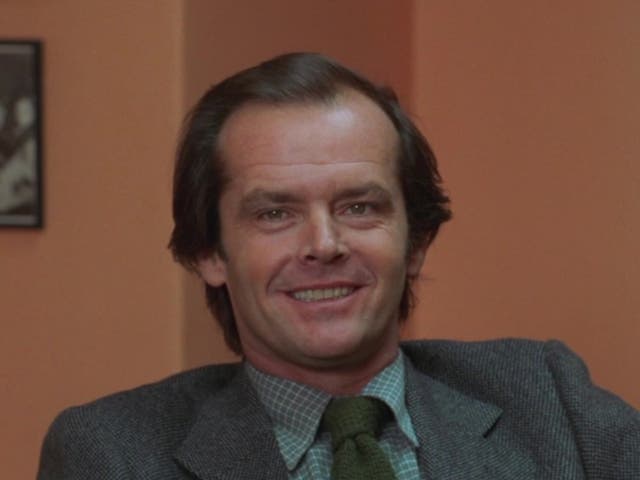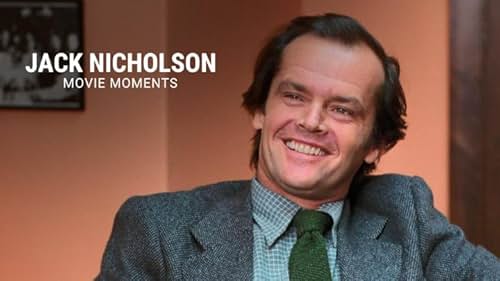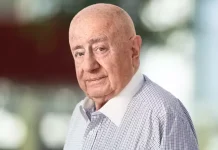John Joseph “Jack” Nicholson, born on April 22, 1937, in Neptune City, New Jersey, is an American actor, director, and writer renowned for his exceptional ability to portray deeply complex, often unhinged characters. With a career spanning over six decades, Nicholson earned 12 Academy Award nominations—more than any other male actor—and won three Oscars. Known for his roles in films like One Flew Over the Cuckoo’s Nest, The Shining, and Chinatown, Nicholson’s enigmatic performances redefined what it meant to play antiheroes and villains, influencing generations of actors.

Early Life and Shocking Family Revelation
Nicholson grew up believing his grandmother was his mother and his actual mother, June Nicholson, was his sister. His unconventional family dynamics were hidden from him until 1974, when a Time magazine journalist revealed the truth. By then, both June and his grandmother had passed, leaving Nicholson to grapple with the shocking revelation alone.
Raised primarily in New Jersey, Nicholson attended Manasquan High School, where he developed a love for performing. After graduation, he moved to Los Angeles to live with his “sister” June, who worked in show business. Initially working as an office assistant for MGM Studios, Nicholson began studying acting, taking classes from notable coaches like Jeff Corey.
Struggles and Early Career
Nicholson’s early years as an actor were marked by struggle. He worked in B-movies and low-budget films throughout the 1960s, including The Cry Baby Killer (1958) and several Westerns for director Roger Corman. Though these films did little to advance his career, Nicholson gained invaluable experience as an actor and screenwriter, even co-writing the 1967 counterculture classic The Trip.
His major breakthrough came when he was cast as a supporting character in Easy Rider (1969), directed by Dennis Hopper. In the role of George Hanson, a drunken, idealistic lawyer, Nicholson delivered a standout performance, earning his first Academy Award nomination. The film’s success opened doors for him, introducing him to mainstream Hollywood and marking the beginning of a long and illustrious career.
Rise to Stardom in the 1970s
The 1970s proved to be a golden era for Nicholson, during which he cemented his place among the finest actors of his generation. His role as the troubled private investigator J.J. Gittes in Roman Polanski’s Chinatown (1974) is often regarded as one of the best performances of his career. In the neo-noir thriller, Nicholson’s portrayal of a detective caught in a web of corruption and betrayal was nuanced and gripping, embodying the disillusionment of 1970s America.
In 1975, Nicholson reached new heights with his performance in One Flew Over the Cuckoo’s Nest. Directed by Miloš Forman and based on Ken Kesey’s novel, the film tells the story of Randle McMurphy, a rebellious patient in a mental institution who challenges the oppressive authority of Nurse Ratched. Nicholson’s electrifying performance earned him his first Academy Award for Best Actor, making the film one of only three to win all five major Oscars—Best Picture, Best Director, Best Actor, Best Actress, and Best Screenplay.
Versatility and Iconic Roles
Nicholson’s ability to play morally ambiguous characters became his trademark. Throughout the 1980s, he delivered a string of iconic performances. In Stanley Kubrick’s The Shining (1980), he played Jack Torrance, a writer descending into madness while isolated in a haunted hotel. Nicholson’s menacing delivery of the line, “Here’s Johnny!”, became one of the most famous moments in cinematic history, and his chilling performance solidified his reputation as a master of psychological horror.
Nicholson embraced his dark side once again in The Postman Always Rings Twice (1981) and as the devilish Daryl Van Horne in The Witches of Eastwick (1987). In 1989, he took on the role of the Joker in Tim Burton’s Batman. His flamboyant portrayal of Gotham’s most infamous villain was widely acclaimed and became one of the defining performances in superhero cinema, setting the bar for future interpretations of the character.
Later Career: Awards and Personal Triumphs
In 1997, Nicholson delivered one of his most memorable performances in As Good as It Gets. Playing Melvin Udall, an obsessive-compulsive novelist with a gruff demeanor but a heart that slowly softens, Nicholson brought humor and humanity to the role. The performance won him his third Oscar, making him one of the few actors to win three Academy Awards. Helen Hunt, his co-star, also won an Oscar, and their chemistry on screen was widely praised.
Though Nicholson’s career slowed in the 2000s, he continued to take on meaningful roles. In About Schmidt (2002), he played a recently retired man facing existential questions, delivering a poignant and understated performance. In The Departed (2006), directed by Martin Scorsese, Nicholson portrayed mob boss Frank Costello, a ruthless criminal inspired by real-life gangster Whitey Bulger. His performance in The Departed added a menacing charm that elevated the film, which went on to win the Academy Award for Best Picture.
Personal Life and Relationships
Nicholson’s personal life was as colorful as his on-screen characters. Known for his charisma and charm, Nicholson was linked romantically to numerous high-profile women, including actresses Anjelica Huston and Lara Flynn Boyle. Although he never married officially, Nicholson fathered five children from different relationships. His tumultuous relationship with Huston, which lasted nearly two decades, was often marred by infidelity and public drama.
Nicholson is also known for his love of art and sports. An avid collector, he amassed a significant art collection over the years, and as a lifelong Los Angeles Lakers fan, he became a fixture at the team’s home games, frequently seen courtside at the Staples Center.
Retirement and Legacy
In the later years of his career, Nicholson took on fewer roles, preferring to enjoy a quieter life. His last major film appearance was in How Do You Know (2010), a romantic comedy that received mixed reviews. Reports began to circulate that Nicholson had retired from acting due to memory issues, though he never publicly confirmed this.
Despite his reduced presence on screen, Nicholson’s influence on the craft of acting remains undeniable. Known for his ability to blend charm, intensity, and humor, Nicholson left an indelible mark on cinema. His fearless exploration of flawed, complicated characters reshaped Hollywood’s portrayal of antiheroes and villains, inspiring actors such as Leonardo DiCaprio, Christian Bale, and Joaquin Phoenix.
Conclusion
Jack Nicholson’s career is a testament to the power of bold, unorthodox performances. From rebellious antiheroes to sinister villains, Nicholson portrayed characters that reflected the complexities of human nature. His ability to evoke empathy, fear, and laughter—sometimes all at once—made him one of the greatest actors in film history. With three Academy Awards and countless unforgettable roles, Nicholson’s legacy transcends generations. Even as he enjoys his retirement, his films continue to inspire, proving that his impact on cinema will endure for decades to come.






